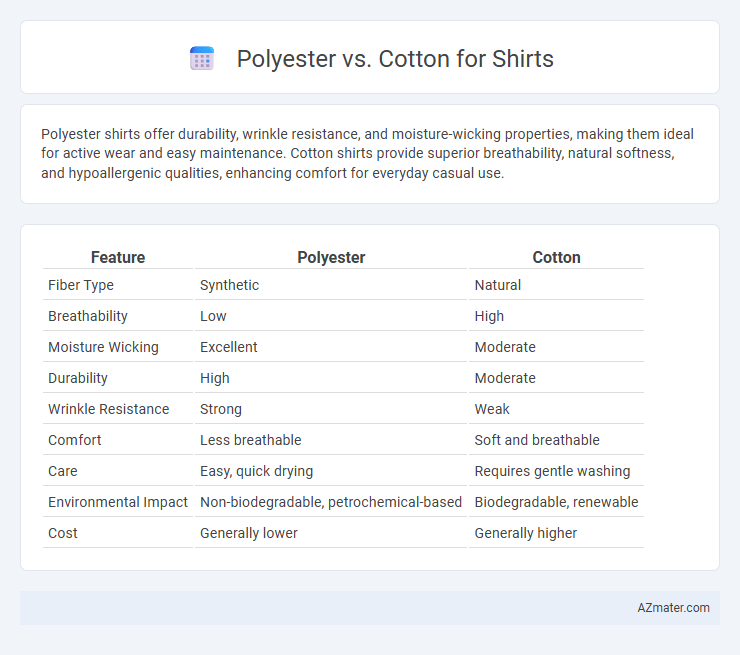Polyester shirts offer durability, wrinkle resistance, and moisture-wicking properties, making them ideal for active wear and easy maintenance. Cotton shirts provide superior breathability, natural softness, and hypoallergenic qualities, enhancing comfort for everyday casual use.
Table of Comparison
| Feature | Polyester | Cotton |
|---|---|---|
| Fiber Type | Synthetic | Natural |
| Breathability | Low | High |
| Moisture Wicking | Excellent | Moderate |
| Durability | High | Moderate |
| Wrinkle Resistance | Strong | Weak |
| Comfort | Less breathable | Soft and breathable |
| Care | Easy, quick drying | Requires gentle washing |
| Environmental Impact | Non-biodegradable, petrochemical-based | Biodegradable, renewable |
| Cost | Generally lower | Generally higher |
Introduction to Polyester and Cotton Shirts
Polyester shirts are made from synthetic fibers known for durability, moisture-wicking properties, and resistance to wrinkles and shrinking. Cotton shirts, derived from natural fibers, offer superior breathability, softness, and hypoallergenic qualities, making them ideal for sensitive skin. Comparing the fabric composition highlights polyester's strength and easy care against cotton's comfort and natural feel, guiding consumers in fabric choice for shirts.
Fiber Composition and Fabric Structure
Polyester fibers are synthetic, made from petrochemicals through a polymerization process, resulting in a strong, durable filament with high resistance to wrinkles and shrinkage. Cotton fibers are natural cellulose-based cellulose fibers derived from the cotton plant, featuring a staple fiber structure that provides breathability, softness, and moisture absorption. Fabric structure differs as polyester is often woven or knitted into tightly packed, smooth fabrics, while cotton fabric features a more open, porous weave that enhances comfort and air permeability.
Comfort and Breathability Comparison
Cotton shirts offer superior breathability and natural moisture absorption, making them ideal for comfort in warm weather and sensitive skin. Polyester shirts excel in durability, moisture-wicking properties, and quick-drying capabilities, suitable for active wear but may retain heat and cause discomfort in prolonged use. Choosing between cotton and polyester depends on prioritizing breathability and comfort versus performance and maintenance.
Durability and Longevity
Polyester shirts exhibit superior durability compared to cotton due to their synthetic fibers, which resist shrinking, stretching, and wrinkles, enhancing their longevity. Cotton shirts, while breathable and comfortable, tend to degrade faster with frequent washing and prolonged wear, often showing fabric thinning and fading over time. Choosing polyester ensures a longer-lasting shirt that maintains its shape and appearance through extensive use.
Moisture Management and Quick-Drying Ability
Polyester excels in moisture management due to its hydrophobic fibers that wick sweat away from the skin, promoting faster evaporation and keeping the wearer dry. Cotton, while breathable and soft, tends to retain moisture, resulting in longer drying times and potential discomfort during intense activities. For quick-drying performance, polyester shirts are superior, making them ideal for activewear and environments where rapid moisture evaporation is essential.
Maintenance and Care Requirements
Polyester shirts offer superior wrinkle resistance and quicker drying times compared to cotton, requiring less frequent ironing and simpler care routines. Cotton shirts demand more delicate handling, often needing gentle washing and careful drying to prevent shrinkage and fabric wear. Choosing polyester minimizes maintenance efforts, while cotton prioritizes natural breathability despite higher upkeep.
Environmental Impact and Sustainability
Polyester production relies heavily on non-renewable petroleum resources and emits significant greenhouse gases, contributing to environmental degradation and microplastic pollution in oceans. Cotton cultivation, while renewable, demands high water usage and extensive pesticide application, leading to soil depletion and water scarcity issues. Sustainable alternatives like organic cotton and recycled polyester seek to mitigate these impacts by reducing chemical inputs and promoting resource efficiency.
Cost Analysis and Affordability
Polyester shirts generally cost less than cotton due to lower raw material and manufacturing expenses, making them a budget-friendly option for consumers. Cotton shirts tend to be pricier because of the natural fiber's cultivation and processing requirements, which influence the overall retail price. For affordability, polyester offers better initial savings, while cotton's durability may result in longer-term value despite higher upfront costs.
Suitability for Different Occasions
Polyester shirts excel in durability and wrinkle resistance, making them ideal for travel and long workdays, while cotton shirts offer superior breathability and comfort, perfect for casual and summer events. Cotton's natural fibers provide better moisture absorption and softness, enhancing comfort for outdoor activities and relaxed settings. Polyester blends can balance functionality and appearance, suitable for semi-formal occasions where ease of care and longevity are important.
Choosing the Right Fabric for Your Needs
Polyester shirts offer durability, moisture-wicking properties, and wrinkle resistance, making them ideal for active lifestyles and low-maintenance wear. Cotton shirts provide natural breathability, softness, and comfort, perfect for sensitive skin and warmer climates. Selecting the right fabric depends on factors such as climate, activity level, and personal comfort preferences.

Infographic: Polyester vs Cotton for Shirt
 azmater.com
azmater.com